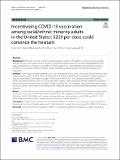| dc.contributor.author | Chen, Kevin | |
| dc.contributor.author | Wilson-Barthes, Marta | |
| dc.contributor.author | Harris, Jeffrey E. | |
| dc.contributor.author | Galárraga, Omar | |
| dc.date.accessioned | 2023-01-17T13:24:53Z | |
| dc.date.available | 2023-01-17T13:24:53Z | |
| dc.date.issued | 2023-01-11 | |
| dc.identifier.uri | https://hdl.handle.net/1721.1/147112 | |
| dc.description.abstract | Abstract
Background
More than two years into the coronavirus disease (COVID-19) pandemic, it remains unclear whether financial incentives can reduce vaccine hesitancy and improve uptake among key unvaccinated populations. This study estimated the willingness of racial/ethnic minority adults in the United States to accept financial incentives for COVID-19 vaccination and the minimum amount needed to vaccinate a sufficiently high percentage of this population.
Methods
From August through September 2021, we conducted an online survey of 367 Black/African American and Hispanic patients, age ≥ 18 years, from 8 community health centers in Rhode Island. Contingent valuation questions assessed respondents’ willingness-to-accept (WTA) incentives for COVID-19 vaccination using random-starting-points and iterative incentive offers of $5 to $50 per dose. Ordered logistic regression models examined associations between respondent characteristics and WTA. Predictive probabilities were modeled using both within-survey range and out-of-survey range incentive offer amounts and compared against vaccination thresholds needed to reach herd immunity.
Results
Less than 30% of unvaccinated survey respondents were WTA an incentive of $50/dose for vaccination. Models using out-of-survey incentive offer amounts greater than $50 suggested that 85% of respondents would agree $140/dose (95% CI: $43-$236) could convince other people to accept vaccination, while $209/dose (95% CI: -$91-$509) would be needed for 85% of respondents to accept vaccination themselves.
Conclusions
Findings from this analysis may inform the design of incentive schemes aiming to reduce racial/ethnic disparities in vaccine and booster uptake, which will continue to be important as new variants of SARS-CoV-2 emerge. | en_US |
| dc.publisher | Springer Berlin Heidelberg | en_US |
| dc.relation.isversionof | https://doi.org/10.1186/s13561-023-00417-y | en_US |
| dc.rights | Creative Commons Attribution | en_US |
| dc.rights.uri | https://creativecommons.org/licenses/by/4.0/ | en_US |
| dc.source | Springer Berlin Heidelberg | en_US |
| dc.title | Incentivizing COVID-19 vaccination among racial/ethnic minority adults in the United States: $209 per dose could convince the hesitant | en_US |
| dc.type | Article | en_US |
| dc.identifier.citation | Health Economics Review. 2023 Jan 11;13(1):4 | en_US |
| dc.contributor.department | Massachusetts Institute of Technology. Department of Economics | en_US |
| dc.identifier.mitlicense | PUBLISHER_CC | |
| dc.eprint.version | Final published version | en_US |
| dc.type.uri | http://purl.org/eprint/type/JournalArticle | en_US |
| eprint.status | http://purl.org/eprint/status/PeerReviewed | en_US |
| dc.date.updated | 2023-01-15T04:10:40Z | |
| dc.language.rfc3066 | en | |
| dc.rights.holder | The Author(s) | |
| dspace.embargo.terms | N | |
| dspace.date.submission | 2023-01-15T04:10:40Z | |
| mit.license | PUBLISHER_CC | |
| mit.metadata.status | Authority Work and Publication Information Needed | en_US |
